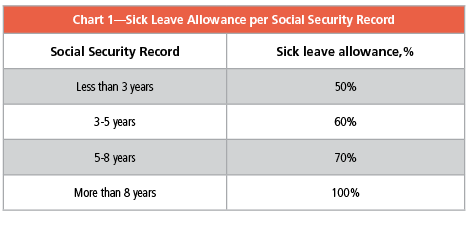Once the center of the first eastern Slavic state and then a Soviet republic, Ukraine gained its independence from the former Soviet Union in 1991. It is bordered by Russia in the east and Poland, Hungary, and Slovakia to the West. Ukraine has a population of more than 44 million, the majority being ethnic Ukrainians followed by a sizable Russian population. Eastern Orthodoxy is the dominant religion and has influenced the country’s architecture, literature, and music.
Ukraine is one of the world’s largest grain exporters and is known as a global breadbasket. The country also has a large heavy industry sector due to its involvement in creating aerospace and industrial equipment.
Social Insurance Foundation
The employee’s remuneration received for performing employment duties is subject to Unified Social Contribution (USC) in Ukraine and regulated by the Law of Ukraine – “On Single Mandatory State Social Security Contribution and its Accounting.” The USC is calculated by the employer, who is also responsible for deduction and payment of the contribution on behalf for their employees.
As of January 1, 2016, the main USC rates are:
-
General rate of 22% on accrued monthly income of the employee
-
Exceptional rate of 8.41% on accrued monthly income of the disabled employee, applies to entities that hire disabled employees
-
Exceptional rate of 5.5% on accrued monthly income of the disabled employee who works at companies and in organizations of public organizations of invalids, where the number of disabled is not less than a half of total employment, and their payroll budget is not less than a quarter of labor costs
-
Exceptional rate of 5.3% on accrued monthly income of the disabled employee, who works (does work, provides services) at companies and in organizations of all Ukrainian public organizations of disabled, including Ukrainian Society of the Deaf and Ukrainian Society of the Blind, invalids, where the number of disabled is not less than a half of total employment, and their payroll budget is not less than a quarter of labor costs
In case the accrued monthly income of the employee is lower than the official established minimum wage, the amount of USC should be calculated from the amount of minimum established wage but not from accrued income.
The payroll cap for USC is set at 25 times the average monthly cost of living and currently capped at Ukrainian Hryvnia (UAH) 42100.
An employer is obligated to prepare and submit the USC report on a monthly basis within 20 days following the reporting to the State Authorities of Ukraine. Moreover, in case the number of rows in the report exceeds five, it should be submitted to the State Authorities electronically (via special software).
Personal Income Tax
Personal Income Tax (PIT) from the employees’ monthly remuneration is calculated with a fixed tax rate of 18%.
It is worth mentioning that the remittance of PIT to the budget is performed together with both advance and salary payments.
An employer is obligated to prepare and submit the PIT report on a quarterly basis within 40 days following the reporting quarter to the State Authorities of Ukraine.
Military tax is set at 1.5% from the incomes of employees from their salaries, as well as from other accrued incomes of residents and nonresidents of Ukraine that are subject to PIT.
The military tax is deducted from employees’ gross salary and remitted to the budget together with advance and salary payment.
Payroll Calculation Procedure
The salary in Ukraine is payable to employees twice per month with an interval between payments not exceeding 16 days (advance payment and final salary payment). The amount of an employee’s salary rate should be indicated in his or her employment agreement (duly stamped and signed by both employee and authorized representative from the employer’s side).
The calculation of salary is performed according to the timesheet reflecting the days (hours) worked by each employee. It should contain information on vacation days, sick leave, business trips, overtime, and work on weekends and holidays, etc. It is obligatory to maintain the timesheet for all the companies in Ukraine (including small enterprises) as the respective documents serve as a grounds for salary accrual.
Base salary is calculated according to the following formula: an employee’s salary rate/number of working days in a month x number of days worked according to the timesheet.
Net salary is calculated as follows: Gross salary - PIT (18%) - MT (1.5%) - other deductions.
The salary calculation is performed in a payroll calculation sheet (the recommended template of which is prescribed by law). It should reflect the amount of gross and net salaries as well as information on payroll taxes.
Protection of Employment
Work Hours
In Ukraine, the normal working hours of employees may not exceed 40 hours per week. Employees working in certain specified hazardous conditions and employees between 16 and 18 years of age may not work more than 36 hours per week, and pupils 14 and 15 years of age who work during holidays may not work more than 24 hours per week. Overtime is possible in certain circumstances but must be documented in a certain way and must be compensated with additional time off or by payment at double rate.
Vacation
Employees are entitled to 24 calendar days of base annual vacation (except individuals providing services under the civil law agreement). Employees can also take unpaid leave of not more than 15 calendar days per year. Employees are also entitled to additional vacation in case of work in hazardous conditions and specific nature of work, etc.
Vacation allowance is calculated based on the employee’s average daily salary. The average daily salary for vacation allowance purposes is determined according to the employee’s compensation for the previous 12 months (or other relevant period) divided by the number of calendar days in a 12-month period (days of statutory holidays and days of unpaid leave are not included).
Sick Leave
If an employee is absent from work due to sickness, he or she must provide the employer with a document substantiating the absence (i.e., sick leave certificate). An employer compensates the first five calendar days of a sick leave, and the other sick leave days are compensated by the Social Security Fund of Ukraine for Temporary Disability.
According to the decree of the Cabinet of Ministers of Ukraine, all calendar days of sick leave including statutory holidays and non-working days are payable. Sick leave allowance is calculated based on the employee’s average salary to be determined with the application of a special algorithm prescribed by Ukrainian law. Moreover, an employee’s sick allowance depends on his/her social security record (see Chart 1).

Chart 1—Sick Leave Allowance per Social Security Record
Sick leave allowance is calculated as an employee’s average salary x number of sick leave days x percentage of sick leave allowance.
Maternity and Childcare
An employee provides an employer with a sick leave certificate, which is issued from the 30th week of pregnancy directly on 126 calendar days (70 days before the childbirth and 56 after). Sick leave could be prolonged for 14 days after the childbirth in case of complications during the childbirth (upon the doctor’s decision).
Leave for the reason of pregnancy and childbirth is 100% compensated by the employer (without application of percentage scale). A childcare leave for a duration not exceeding three years could be provided to the employee upon request (the respective application is required from the employee’s side).
Employment of Disabled Individuals
According to the law, the employer must employ the disabled as at least 4% of its annual average entire workforce, or if it employs from eight to 25 employees—one disabled person.
Employment Procedure
When hiring, an employment agreement/contract is provided to the employee. The respective document includes information on the employee’s position, date of hiring, salary rate, terms of payment, working conditions, personal details, etc.
Moreover, according to the Law No 71-VIII, an employee cannot be admitted to work without a signed employment agreement/contract, duly prepared order on employment, and appropriate notification of the State Fiscal Services about his/her employment.
The respective order on employment and job description are also provided to the employee for his or her signature. In turn, the employee provides the employer with the following documents: application for employment duly signed, labor book, and scanned copies of diplomas.
Termination of Employment
Employment can be terminated by the employer or the employee. All terminations of employment require written form (paper form). An employee informs the employer about his or her dismissal two weeks prior to it and provides the respective application on dismissal. However, in case the employees are dismissed “by consent of the parties” they could be dismissed on the same day.
An employer may terminate an employment agreement only in a limited number of cases such as staff redundancy, the employee’s systematic failure to fulfill his or her employment duties, the employee’s insufficient qualifications or deteriorating health condition, the employee’s unjustified absence from the workplace for more than three consecutive hours during one working day, etc.
According to Ukrainian law, the dismissal of pregnant women, women who have children below the age of 3 (or, in special circumstances supported by medical evidence, below the age of 6), and single mothers who have children below the age of 14 or disabled children under the age of 18, is prohibited.
The employer is obligated to pay the employee the salary for the number of days worked in the month of dismissal, the compensation for unused vacation days, and other payments he or she is entitled to (e.g., bonuses, allowances). The final settlement with the dismissed employees is made on their last working day.

Nadiya Omelchuk is a Country Executive of Eurofast in Ukraine where she coordinates and acts as the liaison for clients in Ukraine and the Eurofast offices in Southeast Europe and the Eastern Mediterranean. She joined Eurofast more than seven years ago and helps with investment projects, international business, corporate and immigration, residency, work permits, and payroll services for Cyprus, Greece, Ukraine, and Russia. Nadiya is fluent in Ukrainian, English, and Russian.